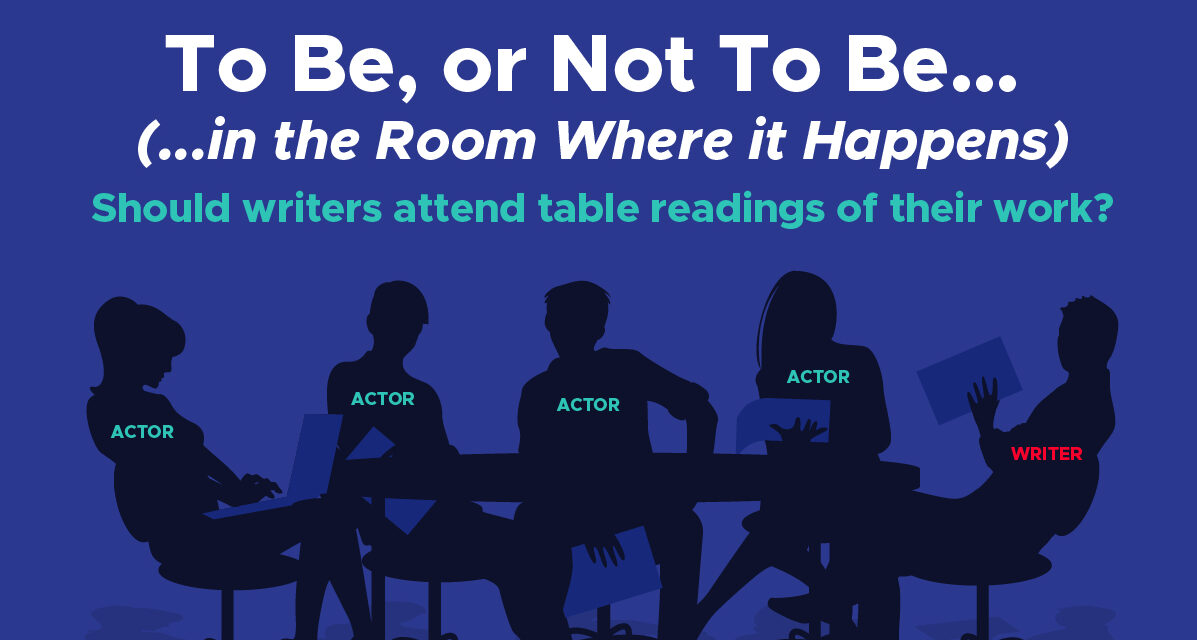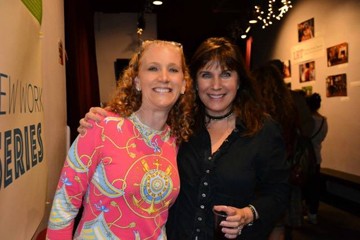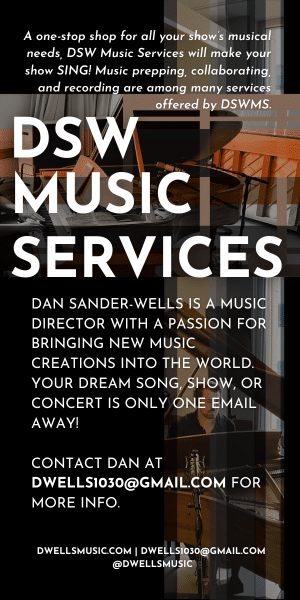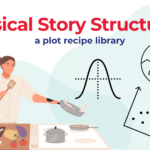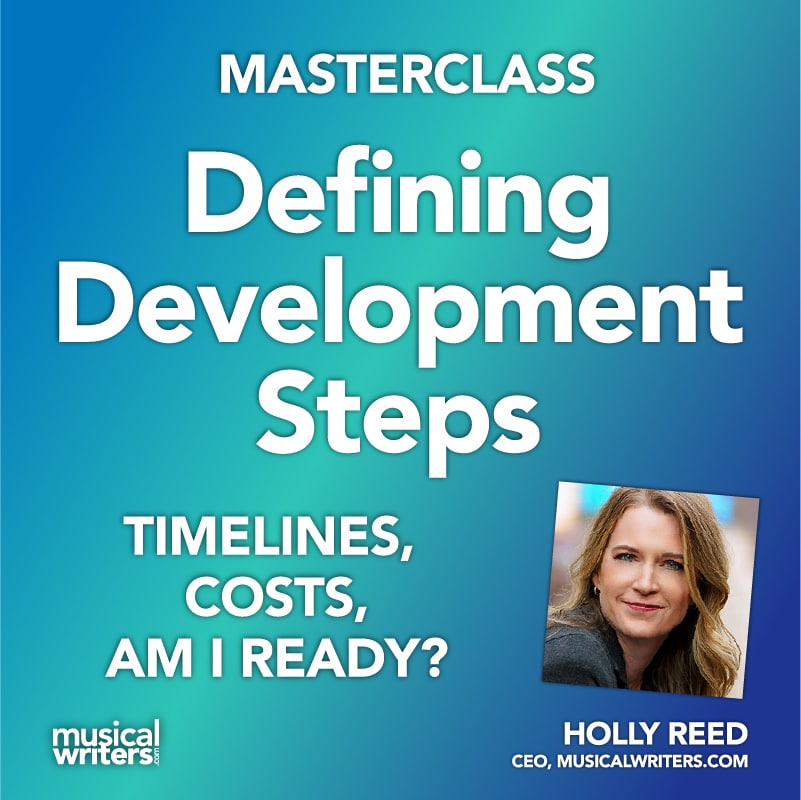This conversation about whether musical writers should attend table readings of their work was recently shared in the MusicalWriters Academy Online Community (shared here with permission):
• • •
Producing Director Rebecca Lowrey: Hi! Here’s a quote for your MusicalWriters Table Read.
Writer: Thanks for the quote. Am I able to attend the table reading in person?
Rebecca: In my experience, I get more honest and open feedback from the actors when the writer is not present. Everyone loves to give their thoughts and opinions. But they never wish to hurt anyone’s feelings. So that is something to consider if you are wanting to be present for the table read.
Writer: Thanks – we are going to go in a different direction.
A few weeks later…
Writer: I just went to a small, invited, initial table-read of a new work where I was specifically there to give feedback. The playwright was in the room reading the stage directions. The script was, in my opinion, “problematic.” But I didn’t feel open to share my assessments because of the playwright’s presence. So I met with the producer privately, later. All this to say and confirm your wisdom of not including the playwright in your readings.
End Scene.
• • •
Should musical writers be in the “room where it happens” when actors are reading their work?
Conventional wisdom and practice says yes, a musical writer should attend all table readings.
MusicalWriters would say…
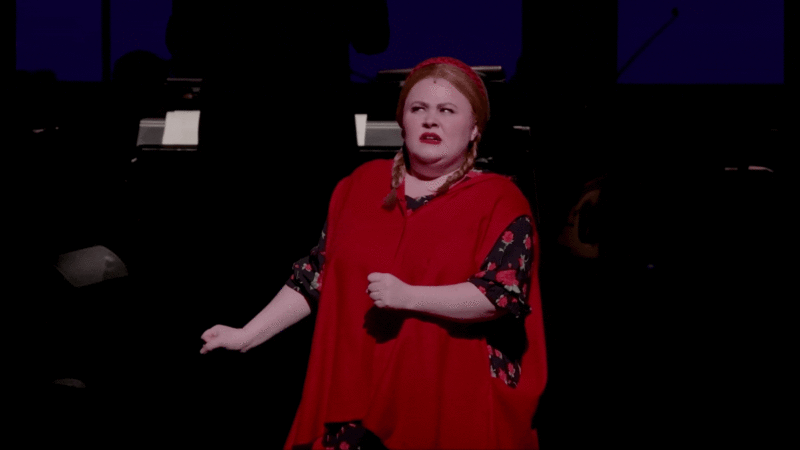
But why? The answer is a combination of assessment theory and practical musical theatre experience.
<takes off musical writer hat and puts on educator, day-job hat>
Different Types of Assessment and Feedback
There are many different types of assessments (and feedback) that can be applied to written work. These are self-assessment, peer assessment, expert assessment, and authentic (public opinion) assessment. This is true whether you are a student submitting a 5-paragraph essay on the history of the American Musical for an English class or a lyricist, crafting your next magnum opus for Broadway.
Self Assessment
Self Assessment is reflection and analysis that the writer does on their own work. Perhaps with a series of prompts or some guidance. For a musical writer, this could involve script or score editing or participating and taking notes during/after a live reading/performance. It could also include viewing a recording of a performance.
Peer Assessment
Peer Assessment involves having classmates provide feedback on your work. In the musical writer’s world, a “peer” might be another writer, a performer, a director, or even a savvy audience member. Anyone with similar knowledge of the industry who can tell you what they liked and disliked in your script could be considered a peer. This category is probably where most reading session feedback queries fall. But, without careful planning and guidance, it can also be one of the least rewarding types of feedback. (And this is true both in the classroom and in the theatre.)
Expert Assessment
Expert Assessment in the classroom occurs when teachers grade a draft of the writing assignment. They may give suggestions for future improvements or note strengths. In the context of giving feedback, an expert is not only someone who knows the subject matter well, but also someone who is knowledgeable in teaching and learning and providing feedback that is constructive and motivating. (So, no matter the concept, this is why you should always choose your “experts” carefully.)
Authentic Assessment
Authentic or “public opinion” Assessment is “real world” assessment. Does the audience laugh at the jokes in the script? Are there awkward silences? Any specific lines or beats that seemed to throw your actors? This could also include feedback like reviews of a production or even box office sales, but it is not “tell me what you thought of the script” feedback in the traditional sense.
All of these assessment types have value and merit. But they all have their pitfalls, too. And there are lots of ways that having a musical writer attend table readings and feedback sessions could skew your feedback data.
The Problem with Peers
For example, is an audience of theater peers – who are likely also your friends and family – actually going to tell you the hard truths about the problems in your script? Will that audience you are observing be more apt to laugh if they know you are in the audience? Will you be able to objectively evaluate your script in a room where nerves and excitement are high? All of these are examples of situations where a writer attending their own table reading is going to influence the feedback data.
On the other hand, there are also situations where your goals for a reading might be a confidence or community boost, rather than hard-hitting feedback. In that case, you should ABSOLUTELY be in the room where it happens! There is nothing like the glow that comes with hearing your work performed by talented friends and hearing all the parts they liked about it.
<takes off educator hat and puts on Musical Writer hat>
Musical Reading Feedback
So what does that all mean for a writer who knows that they need feedback on their script, but may not know what to do next? Well, for MusicalWriters table readings, we simplify this down to the following types of feedback:
- Self
- Audience
- Actor
- Director
All of these types of feedback occur both during the reading preparation process and after the reading has completed. They include guided feedback sessions between the cast and director, as well as a debrief session afterwards between the director and writer. Whether a writer chooses to attend their reading or not, a video recording is also provided. If you are interested in one of these fully guided reading and feedback experiences, learn more about our MusicalWriters Table Reads here.
But if you are choosing to “go a different direction” by organizing your own reading and feedback session, here are a few steps to help ensure that the feedback you receive is as unbiased and helpful as possible… even if you ARE in the room.
Tips for Getting Quality Feedback from Your Next Musical Reading
1. Decide what you are specifically hoping to gain from the table reading or feedback session before it is scheduled.
Then, use these goals to dictate what kind of reading or feedback session you organize. For example, are you specifically looking for scenes in your script that could be cut? It might be most helpful to set up a reading that enables you to hear the script out loud (Self-Assessment). You could also make an inconspicuous video recording that includes the audience that you can view later to see when people were most engaged and when they were restless (Authentic/Audience Assessment). In this case, you could TOTALLY be in the room and meet your feedback goals.
2. Plan specific and concrete feedback prompts.
This is another tip taken from the education assessment world. The more specific and intentional your question, the more helpful the feedback you get should be. So instead of asking peers “what did you like?” ask, “what is one moment from the reading when you remember smiling? (And why?)” Instead of asking “What didn’t work in this show?” try asking your audience, “If you had to cut one number from this show, which would you get rid of, and why?” These concrete questions should elicit a more honest and helpful response, regardless if the musical writer is attending the table reading or not.
Post-Reading Feedback Question Prompts
Here are 10 of our favorite open-ended feedback prompts to get you started:
- If you had to describe this show in one sentence for a friend of family member, what would you say?
- If you were given a red pen, what’s one thing you would change about the show?
- If someone else had a red pen, what would you beg them to save?
- Was there a moment in the script you remember that made you laugh (or at least smile)? What was it?
- What song (if any) was stuck in your head after the show?
- Did you feel confused or bored at any point? If so, when?
- What is one “stupid question” you wish you could ask during the show?
- If demographics or talent was no object, what role in the show would you want to play? Why?
- Was there anything in the show that surprised you, or defied the expectations you had beforehand?
- Did any character or moment in the show remind you of something in your real life? If so, what?
3. Share prompts before the reading.
This technique works whether you are sending someone your script for asynchronous feedback, or hosting a feedback session after a reading. Let your audience know beforehand what you want them to look for (e.g. moments when they were bored, times they laughed, etc.) so they can make notes as they go, and then answer more fully afterwards. This will also help your audience or reader be more engaged during the reading.
4. Brainstorm possible feedback biases beforehand and work around them.
For example, if you are soliciting constructive feedback from friends and family – who may give you only positive comments – make sure they know that you will be compiling everyone’s feedback and looking for trends. And that you will not be taking anything personally. You could also share with them some struggles you are aware of in the script, so they can help. (e.g. “I want to submit this script for a MusicalWriters staged reading, but I need to figure out how to get the cast list down to a manageable number first.”)
If you think you’ll get better feedback from the group if you’re not in the room, recruit a feedback coordinator to take over and compile the comments after a reading. That way you could be present for the actual reading, but leave for the feedback session.
5. Recruit a ringer.
Alternatively, if you’re going to be having a live feedback session after a reading or performance, especially if you are in the audience, considering having one “feedback plant” in the group whom you’ve talked to beforehand. Ask that ringer to either play devil’s advocate or specifically provide constructive criticism for others to hear. After hearing the ringer’s comments, other folks may be more likely to share their honest opinions.
6. Use technology to create anonymity.
Use digital tools that allow people to submit questions or comments anonymously for more honest feedback. For real-time digital feedback, I love the tool Slido for surveys and Q&A sessions. Slido has a generous free plan, embeds easily into other websites, and works well on mobile devices, and you can allow people to see real-time results, much like in a Twitter or Instagram poll.
Should Musical Writers Attend Table Readings of Their Own Work?
Overall, the place where you are on your show’s development journey, and the kind of feedback you’re hoping to receive, will determine which type of feedback you should seek. And, ultimately, if you, the musical writer should be in attendance when that table reading and assessment takes place.
And if this all has you a bit cross-eyed, don’t worry! Contact us at MusicalWriters, and we would be happy to steer you in a feedback direction that is right for YOU; whether that is a truly objective reading that we organize for you, or recommendations of steps and tricks to help you organize a reading on your own.
We even offer “in the room” feedback sessions from Experts at our annual MusicalWriters Festival. Click HERE for more information about the Festival (which provides the opportunity for you to have your work performed in front of our Festival audience—for free!).

